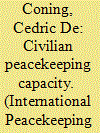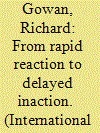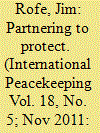| Srl | Item |
| 1 |
ID:
107838


|
|
|
|
|
| Publication |
2011.
|
| Summary/Abstract |
The timely deployment of suitably qualified civilian personnel is a challenge that none of the organizations that deploy peacekeepers has yet addressed. This challenge has floundered on the periphery of the peacekeeping debate for many years, but a 2010-11 UN civilian capacity review provides a unique opportunity to focus attention on the problem. This article proposes the formation of a global civilian capacity partnership that brings together the training and roster community, the UN Secretariat and a grouping of interested states, with the aim of significantly improving the UN Secretariat's ability to identify, recruit and deploy suitably qualified civilian personnel in a reasonable time, and without adverse side effects for the local community or the mission mandate.
|
|
|
|
|
|
|
|
|
|
|
|
|
|
|
|
| 2 |
ID:
107839


|
|
|
|
|
| Publication |
2011.
|
| Summary/Abstract |
In 2008, the UN faced a military and humanitarian crisis in the eastern Democratic Republic of Congo and asked the EU to send a rapid-reaction force to help stabilize the situation. The EU failed to do so. This article analyses the immediate circumstances and consequences of this non-deployment. It also identifies longer-term flaws in the EU-UN relationship which contributed to European inaction in this crisis. The article argues that the events of 2008 meant that over-inflated expectations of European rapid-reaction capabilities have been replaced with an assumption that the EU is no longer a significant military player in sub-Saharan Africa. Studying this 'non-event' provides a clearer understanding of the wider EU-UN relationship than can be derived from studying examples of successful inter-institutional cooperation alone.
|
|
|
|
|
|
|
|
|
|
|
|
|
|
|
|
| 3 |
ID:
107835


|
|
|
|
|
| Publication |
2011.
|
| Summary/Abstract |
Peacekeeping is an overburdened and politically fragmented institution. To address peacekeeping's predicament the UN Department for Peacekeeping Operations' (DPKO's) 'New Horizon' agenda proposes to strengthen and deepen internal and external partnerships with the aim of providing rapid, robust and accepted capability-driven responses to conflict. This article explores the implications of such partnerships for peacekeeping, its core principles and the UN's legitimacy as the primary actor tasked with maintaining international peace and security. The author cautions against prioritizing external partnerships at the expense of strengthening meaningful internal partnerships, shoring up political will and clarifying vision and expectations among the Security Council, the Secretariat, member states and, in particular, troop-contributing countries.
|
|
|
|
|
|
|
|
|
|
|
|
|
|
|
|
| 4 |
ID:
107836


|
|
|
|
|
| Publication |
2011.
|
| Summary/Abstract |
In 2009 the New Horizon non-paper published by the UN Departments of Peacekeeping Operations and Field Support (DPKO/DFS) committed to, among other reforms, expanding the base of troop contributors to UN peacekeeping. After describing contribution patterns and partnering options open to states and organizations, this article argues that the most promising options involve drawing on the universe of existing contributors, the two main pillars of which are a group of states that cluster together under the UN and another that cluster together around cross-cutting 'Western' agendas. The article recommends that the UN initiate the formation of Standing High-Readiness Battalions and suggests countries that should be approached. It further recommends that UN and non-UN contributors build on existing divisions of labour involving parallel, sequential and hybrid operations.
|
|
|
|
|
|
|
|
|
|
|
|
|
|
|
|
| 5 |
ID:
107837


|
|
|
|
|
| Publication |
2011.
|
| Summary/Abstract |
Protection of civilians has been on the international agenda for more than ten years. In that time, many UN peace operations have received protection mandates but few have been successfully carried out. Protection requires all elements of a peace mission to have a common understanding of the relevant concepts, processes and desired outcomes. This requires partnerships between the various elements of the mission. Partnership between disparate groups is difficult at the best of times, and is exacerbated by the operational contexts of peace missions. Successful partnerships require extensive pre-mission preparation, in-mission coordination and post-mission evaluation. Participants have only just begun to address these issues at a basic level.
|
|
|
|
|
|
|
|
|
|
|
|
|
|
|
|
| 6 |
ID:
107840


|
|
|
|
|
| Publication |
2011.
|
| Summary/Abstract |
Although the concept of partnership offers little substantively new to the theory and practice of peace operations, it provides a useful political frame to advance reform efforts in UN policing. In the last few years, several improvements have been made in doctrine, training and increasing the pace of deployment. However, the case of Timor-Leste suggests that these efforts have not resulted in obvious improvements in the abilities of the UN Police (UNPOL) to carry out their mandated functions. Solutions offered by the New Horizon agenda are technical and do not address the political dimensions of the problems encountered in field missions. In Timor-Leste, the host government is not interested in engaging in a partnership with UNPOL. Problems with international policing may be so deep, complex and subject to politics that even substantial process-oriented solutions will not achieve significant results.
|
|
|
|
|
|
|
|
|
|
|
|
|
|
|
|